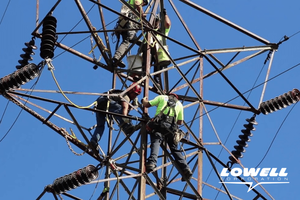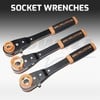The U.S.’s electrical grid includes about 200,000 miles of high voltage (over 230 kilovolts) power lines. The transmission linemen who maintain this grid help to keep the country’s lights on. This network of wires provides a reliable electricity supply across the nation, but what tools should transmission linemen carry to get the job done? Keep reading our list of essential tools for more information on best installing and repairing these lines.
If you’re looking for transmission lineman wrenches for high-line utility pole installation and repair, Lowell offers 6 proven models. Regarding ratcheting lineman’s transmission tower wrenches, we recommend models 103T, 104T, 105T, 52 DS, 53 DS, and 152 DS. Transmission lineman wrenches provide the greatest flexibility for linemen dealing with multiple-sized hardware. These hand tools feature Lowell’s signature Bolt-Thru design, epoxy paint coatings for durability and easy cleaning, and high-visibility sockets.
What We’ll Cover:
- The right tools for high-line work
- 5 ways transmission linemen protect American energy
- The road to transmission line work
- Recognizing excellence in linemen tool distributors
The Right Tools for High-Line Work
Whether you need a socket wrench, wheel wrench, or valve wrench, our catalog has the right tool for your specific application. You can find our best transmission lineman wrenches below:
- 103 Triple Square Transmission Lineman’s Wrench
- 104 Triple Square Transmission Lineman’s Wrench
- 105 Triple Square Transmission Lineman’s Wrench
- 52 Double Square Transmission Lineman’s Wrench
- 53 Double Square Transmission Lineman’s Wrench
- 152 Double Square Transmission Lineman’s Wrench
In addition, you’ll need to have necessary tools like pliers, screwdrivers, cutters, cable knives, ropes, and rulers. Critical safety equipment such as rubber gloves, leather protectors, steel-toed boots, nearby first-aid, and a hard hat are also must-haves. Typically, you carry all of these in your tool belt. Lowell’s products ensure you always have the right wrenches for the job.
5 Ways Transmission Linemen Protect American Energy
Working as a transmission lineman in the U.S. is undoubtedly tough but highly rewarding. These skilled professionals play a crucial role in maintaining, repairing, and constructing the high-voltage power lines that form the backbone of the American electrical grid. Let’s explore some of the challenges they face and how their work contributes to the protection of the grid and helps communities recover from natural disasters.
1) Challenging working conditionsTransmission linemen often work in extreme weather conditions, such as blistering heat, cold, high winds, and heavy rain. They may need to climb tall transmission towers, navigate difficult terrain, and work at great heights. Despite these challenging circumstances, linemen are dedicated to ensuring that the electrical grid remains operational and reliable.
2) Grid reliability and protectionTransmission linemen play a vital role in maintaining the integrity of the electrical grid. By inspecting, repairing, and replacing transmission lines and related equipment, they help prevent disruptions in the power supply. Timely maintenance and repairs help safeguard against electrical failures and blackouts, ensuring a stable electricity supply for communities, industries, and essential services.
3) Disaster response and recoveryDuring natural disasters like hurricanes, tornadoes, wildfires, or severe storms, transmission linemen are on the front lines of the recovery effort. They work tirelessly to restore power to affected areas, often facing hazardous conditions and time constraints. Their expertise allows them to quickly assess the damage, repair or replace downed lines, and reconnect communities to the grid. By restoring power, linemen provide relief to residents, facilitate emergency response efforts, and contribute to the overall recovery of affected regions.
4) Collaborative effortsLinemen collaborate closely with other professionals, including distribution linemen, engineers, and dispatchers, to ensure effective grid operations. They work to identify potential issues, troubleshoot problems, and implement necessary repairs or upgrades. Their collective efforts help maintain the reliability and efficiency of the electrical grid, protecting against outages and improving the overall quality of electricity distribution.
5) Community support and appreciationThe work of transmission linemen is highly valued by the communities they serve. During power outages or in the aftermath of natural disasters, linemen are often seen as local heroes, working tirelessly to restore normalcy. Community members who rely on electricity for their daily needs, from lighting and heating to medical equipment and communication services, acknowledge and appreciate their dedication and expertise.
Overall, the role of transmission linemen in the U.S. is challenging but immensely rewarding. Through their efforts, they ensure the reliability and resilience of the electrical grid, protect against disruptions, and aid in the recovery of communities after natural disasters. Their unwavering commitment to their work and the valuable service they provide make them essential contributors to the well-being and safety of the nation.
However, not everyone is cut out for the job. Keep reading to learn the most common qualities of a successful line worker. If you’re already a part of the field, we listed some attributes you should aspire to achieve. If you’re thinking about starting any time soon, read our list below:
1) Physical acumen and mental acuityTo become a lineman, you must have considerable physical and mental strength. Working on the line means lugging gear, pulling hefty cable and wire, and tolerating long hours of day or night. Every day presents a different challenge, from unfinished job sites to a variety of inclement weather. Not to mention, dealing with high-voltage lines leaves little room for error. A pylon or transmission tower mistake can be life-threatening for line work.
2) Stamina to climb tall distancesLinemen need to be acclimated climbers, so this role isn’t for acrophobes (that’s fear of heights) or the faint of heart. To be blunt, line work isn’t your calling if you aren’t 100% comfortable dangling several hundred feet above the ground. As a lineman, you’ll be suspended above streets, cities, or freeways for most of your day. The plus side is that untouched nature and scenic landscapes are constantly on your horizon. It’s not office work, but your corner view will beat most other jobs.
3) Intense focus and a calm demeanorLineman work often ranks among the 10 most dangerous jobs in the U.S., with more than 20 workers per 100,000 casualties annually. It’s all because linemen traverse distances hundreds of feet in the air while installing and repairing electrical lines. As a result, they’re often the first people emergency services deploy after natural disasters. Even though lineman safety training is a major part of the role, linemen must be aware of the tremendous sacrifice many in their industry are willing to make.
4) 24/7 dedication to the careerEverything that comes with being a lineman makes it more than a career; it’s a lifestyle. Linemen put their mark on the world one electric pole at a time, requiring a certain amount of pride to ensure each project lives up to their expectations. Because of this, one lapse in fatigue or misplaced tool can ruin an entire zip code – or worse, someone’s life. Linemen must be able to dedicate the time and energy to acquire these skills.
Linemen’s families have to commit to the career choice, as well, because those long hours can take a toll. Emergencies and severe weather can call linemen into work suddenly, and they generally don’t return until the crisis is over. After all, only under these guidelines can transmission linemen fully commit to their careers and the safety of their communities.
5) Comprehensive field trainingWorking on high-voltage lines doesn’t require a doctoral thesis, but that doesn’t mean you can become a lineman overnight. The first step into this career involves becoming an apprentice, meaning at least four years of on-the-job practice. Afterward, you’ll graduate to a journeyman lineman. You must be willing to put the work in because your apprenticeship won’t be in an office – you’ll constantly be out in the field with different crews to learn the ropes.
Many aspiring linemen find out they lack the dedication to fulfill these expectations. According to a senior training specialist at a Chicago linemen school, the dropout rate is about 65 percent among vocational training. To that end, Lowell strives to simplify utility installation and repair for those committed line workers who stick with it.
your lineman tools?
With all the extensive training it takes to join this vocation, Lowell would like to thank everyone who chose this career path. We’re partnering with distributors like Linemen’s Supply, J.L. Matthews, and J. Harlen.
Lowell Corporation is proud to manufacture all its tools right here in the U.S.A. in the heart of New England. All Lowell wrenches are 100% guaranteed with our two-year manufacturer warranty.
The Best American Wrench Manufacturer Since 1869Lowell Corporation offers the best industrial tools in the industry. Whether you need a wheel wrench or a valve wrench, your company deserves the right balance between cost and efficiency. Our custom hand tools make tough jobs easier for design engineers, waterworks engineers, and utility linemen. We’re proud to distribute reliable hand tools to help linemen nationwide.
We’ve been increasing construction, maintenance, and manufacturing productivity since 1869. Let our trusted socket wrench sets simplify your workload no matter which strap wrench set you to need. With our essential lineman tools, you get the backing of the most trusted name in the hand tool industry.
Make sure to follow us on Instagram for exciting product updates and promotions!












